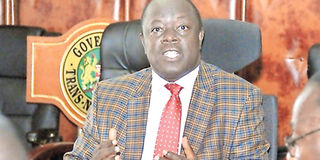Khaemba: My antidote to Kenya’s ailing agriculture

Trans Nzoia Governor, Patrick Khaemba. He notes that as a farming country, we have to change our farming practices. For instance, we have been using the same kind of fertiliser for the last 60 years and still expect our soils to remain productive, which has resulted in soil acidity. PHOTO | JARED NYATAYA | NATION MEDIA GROUP
What you need to know:
- We need to facilitate a change of technology. The British colonialists left the tractor and the plough, which we are still using.
- Agriculture is devolved but we don’t have requisite resources to bring about change on a significant scale.
- Land management is another problem. Subdivision has led to slums in agricultural areas and no one is gaining from this situation. Land is an emotive issue yet it ought to be looked at as means of production.
- Beans, for instance, is a very good crop to rotate with maize because it fixes nitrogen and it is nutritious.
Trans Nzoia has long been considered Kenya’s maize capital. In recent years, however, the county, just like other maize growing regions, has not fared well, thanks to a host of challenges that include drought, pests and diseases, poor inputs and a chaotic market. Governor Patrick Khaemba spoke to Julius Sigei on his proposals for a revival.
Our maize productivity, even in Trans Nzoia, is one of the poorest in the world. Why is that so?
I have never seen a drought as bad as this. Since November 2018, we have not had steady rains and large-scale farmers who had planted have to do it all over again even though the rains are not assured.
But even in a ‘normal’ year, our farmers are lucky to get 20 bags an acre, down from 40 just a decade ago. Farmers are getting poorer by the day, selling their maize below the production cost.
We have to change our farming practices. For instance, we have been using the same kind of fertiliser for the last 60 years and expect our soils to remain productive. This has resulted in soil acidity.
When I assumed office in 2013, I launched soil testing plan and was laughed at until the President joined me and launched it on a national scale.
So what do we do?
We need to initiate a national liming programme to be sponsored by the government. This will combat salinity.
We need to facilitate a change of technology. The British colonialists left the tractor and the plough, which we are still using.
The soils no longer have organic matter because of the way we till our land. We still use the disc plough, an implement that has been abandoned by many countries.
I launched conservation agriculture, which involves minimum tillage among other features, in 2015 but it didn’t pick up for lack of capacity.
I have visited a farm in Nanyuki which applies this technology and the difference between the wheat in the farm and that in neighbouring ones is stark.
There are also small, affordable motorable machines which can change lives. Again we launched this but didn’t go far because of lack of funds.
Agriculture is devolved but we don’t have requisite resources to bring about change on a significant scale.
We also need to embrace biotechnology, which can help us combat pests and diseases. We have not been open to genetically modified crops but perhaps it is time we thought of some of these alternatives.
We have also been talking about conventional irrigation as a country. Now the world has moved on to precision irrigation where you use water economically.
Land management is another problem. Subdivision has led to slums in agricultural areas and no one is gaining from this situation. Land is an emotive issue yet it ought to be looked at as means of production.
My proposal is that we ring-fence large farms with incentives for commercialisation.
As for the subdivision occasioned by inheritance, I propose that these farms be registered as companies and have dependents as shareholders.
The large farms should be mapped out and their utilisation spelt out clearly.
This will stop the current trend where people hoard huge tracts of land for speculation. If you can’t utilise your land, then rent it out.
We should also create cemeteries and compel people to bury the dead there so that the remaining land is used for agriculture. This culture of treating the dead better than the living should end.
What stops us from implementing these wonderful ideas?
As a nation, we are more interested in sensational stuff where people laugh and clap. We talk about grand visions but cannot lay the foundation, yet even simple solutions like crop rotation can make a big difference.
Beans, for instance, is a very good crop to rotate with maize because it fixes nitrogen and it is nutritious.
There are also green grams, which do well even in dry places. Demonstration plots in every corner of the country for this kind of conversation can go a long way in ensuring change.
Is the buying of maize by the National Cereals and Produce Board now smoother?
We need to review all institutions that support agriculture. We should scrap the NCPB because it has failed in its mandate and move to more creative modalities of stabilising prices.
Even after the President directed NCPB to buy a bag of maize at Sh2,500, it purchased only a little and said it had run short of bags.
Farmers also withheld their maize waiting for better prices. If we are to solve our agriculture problems, we shall have to find a way of reducing production costs and increasing our productivity.





